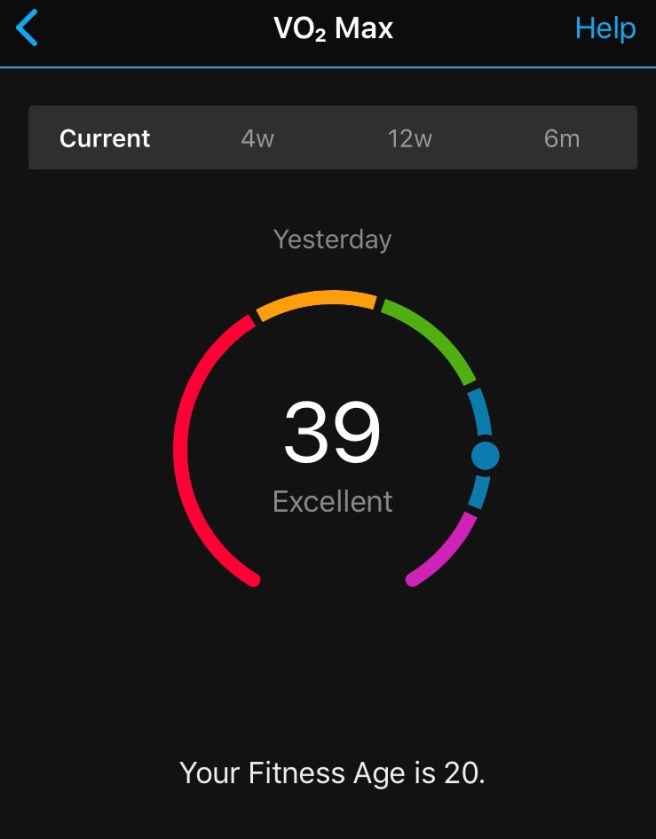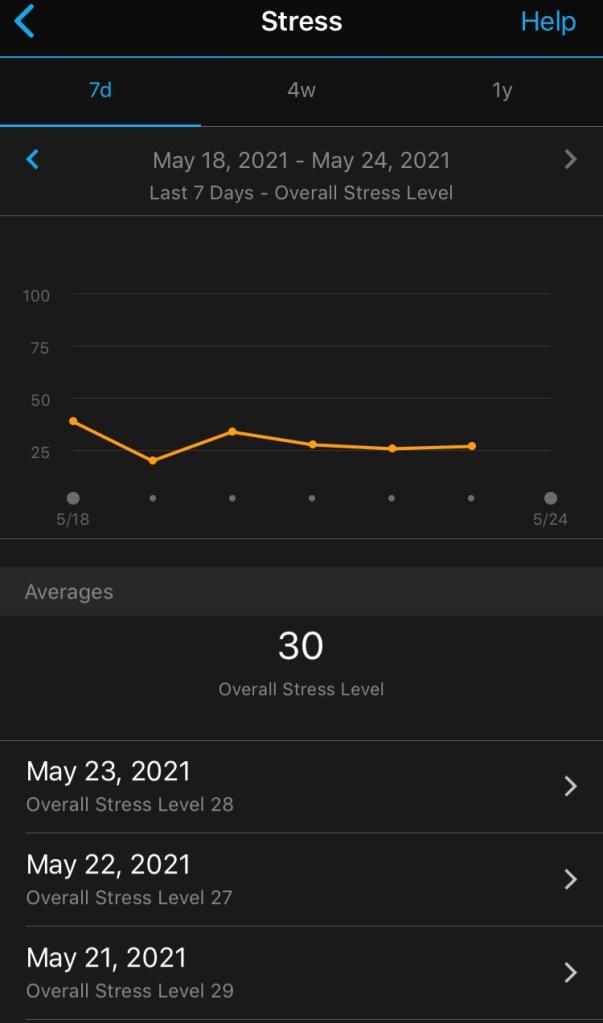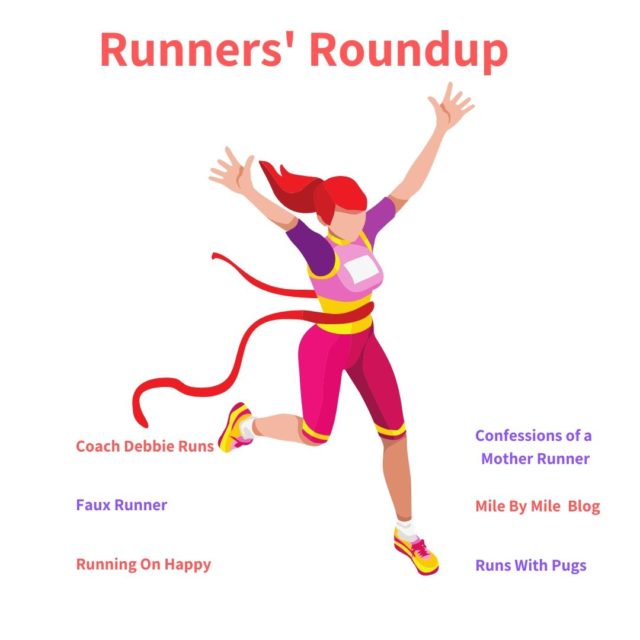
Who doesn’t want to recover quickly so they can have a great next run? It should come as no surprise to people that read this blog for a while that I’m all about taking care of my body so that I can recover quickly. I have a secret weapon for that, too.
G is for Garmin
I have a Garmin Vivoactive 3. Before that I had the original Garmin Vivoactive. I replaced the Vivoactive after about 4 years because a) it was acting a bit wonky and b) I really, really wanted the HR monitor function — which was not built into the original version.
I like that I am not switching back and forth between a regular watch and a Garmin. Because it tracks my sleep, my steps, my floors, my resting heart rate, my stress levels, and so much more — I wear my Garmin Vivoactive 3 24/7. I may have to remember to charge it before a run, but I pretty much always know where it is.
Some of those features are incredibly useful to me: they help me figure out whether or not I should push a run off to another day, or maybe just do an easier run rather than a planned harder workout. Here are the things I check frequently.

V02 MAX
I know that the V02 MAX reported by my Garmin is not extremely accurate, but I’ve found over time it’s pretty consistent. Sure it moves around a point here, a point there, but it usually stays in the same relatively narrow range.

After my COVID vaccines I was struggling with my runs and my energy levels. Sure enough, my V02 MAX had fallen lower than my normal range. It took a while before it settled back into its normal range and my runs slowly started to get better.

Stress
Garmin uses HRV (heart rate variability) to give you a number for how stressed your body is feeling. You may not feel stressed, by your heart doesn’t lie.
I actually find it kind of fascinating. In general my Stress metric is usually in the low range, but I could see it jump up after my COVID vaccines, for instance. I also know that if I see it jump up, it’s another good indicator it’s not time for a hard run (and maybe not any run at all).

RHR (resting heart rate)
Very similar to the Stress metric. If you see this jump up more than 5 points, it’s a good indicator something’s brewing. Although I’m not quite sure of the algorithm Garmin uses, because they do adjust it down sometimes the next day, so I’ve learned to take this one with a grain of salt.
Yes, my RHR jumped up almost 10 points after both vaccines, too. If I see it move up more than 5 points, again, it’s time to either readjust my run or my schedule.
I actually don’t track my heart rate while I run anymore, mostly just running by feel, and for the most part, it’s pretty consistent.
Final Thoughts
A lot of people could care less about these metrics, I know. I sync my Garmin with the app each morning (I believe that helps me to get a signal more quickly), so it’s just a matter of glancing at the info that’s already recorded. There are times I don’t have to look at that to know that it’s not a good idea for me to run hard, or run at all.
There are other times, though, that I don’t feel bad, yet the data says something is brewing. How many times have you felt fine until you didn’t? Tracking these three simple things (if that’s available to you) might help you clue in to fact that you’re not recovering well, for whatever reason, and you can adjust accordingly.
I am not a slave to the numbers, either, but I just find that it’s good information for me, and it’s readily available to me. I like not having to wear a fitness tracker and a GPS watch!
What’s a signal to you that you’ve recovered well?
Do you ever feel fine and then suddenly get sick?
Are you good about adjusting your running due to how you feel?

Linking up with Zenaida Arroyo and Kim @ Kookyrunner
This week I am also joining up with the new Runners’ Roundup linkup.


Glad this works for you.
I have no need for all the bells and whistles.
I have an Apple Watch. It does all that. I only use it for texting, gps when driving and the weather. Lol
Knock on wood. I don’t get sick.
Work making me more exhausted and stressed than running.
Recovery is usually a glass of wine with a good friend. Or often a climb on a fire tower.
What did runners do before all that tech stuff? Just run.
LikeLiked by 1 person
Yup, they did just run. And got sick. And injured.
Not saying this is something you have to do, that’s why it’s “my” secret weapon.
LikeLike
I think we get injured more now IMO
LikeLiked by 1 person
There are far more of us, though.
LikeLike
Oh, now you made me get my phone and check all my data.
I have never looked at my 6-month VO2max history. I could go right back to December 2019 and study the development since then. Since my last 10k race in March 2020, my VO2 max has gone down by about 4 points, right now it’s down even more – about 7 points. Time to get some speed workouts done!
Thanks for this post, Judy, it’s a great reminder.
LikeLiked by 1 person
I’d never looked at 6 month V02 Max either. Mine is very consistent, really, except if I’m sick for a longer time — or getting vaccines, apparently.
LikeLiked by 1 person
I have never gotten into the fitness tracker craze. I’m active enough that I’ve never worried about how many steps/day or heart rate. Also, I’ve always been a “by feel” runner. Even when I’ve wanted to push myself, but something felt off, I have taken things easier than desired. Of course, there have been times when I had sudden crashes in energy (though not very frequent), so I paid attention and scaled things back as needed (hello, Covid vax!). It’s great that all this info is available, though! Thanks for sharing!
LikeLiked by 1 person
I’m with you Kim.
LikeLike
I definitely do like tracking my resting HR. The rest is just there, so it’s interesting to me.
LikeLike
I’m not a huge tech person but love all the data that the Garmin watch gives you. I received an Apple watch for my birthday last year so I’ve been using that for all my fitness tracking and runs. I’m sure there are a TON of features that I’m not utilizing. Your post reminded me that I need to do more research on my watch!
LikeLiked by 1 person
LOL, I haven’t really researched my watch much!
LikeLike
My new Garmin has these features as well and I was enjoying all of the positive feedback. I also apparently have the fitness level of a 20 yo ha I am not sure that is correct but a girl can dream! I do like the metrics though
LikeLiked by 1 person
Yeah, I do find it hard to believe I have the fitness of a 20 year old, too. Then again I’m probably much more fit than I was at 20!
LikeLike
I only wear my Garmin for running these days. There was a time when I wore it all day/night but its kind of big and was annoying to wear to work and to sleep. If I got a new one I would want something smaller. I look the data but don’t read into it too much. I feel like my V02 max is all over the place. Also my HR is kind of all over the place because it doesn’t always read it from my wrist. Its nice to be able to have a way to monitor some of these things though, especially as prevention!
LikeLiked by 1 person
Oddly enough my Garmin is actually quite steady with V02 Max & HR info (although once in a blue moon it reports a false high HR), so for me that’s good info. V02 normally stays in the same 3 point range for me — unless I’m sick. Luckily it’s also not uncomfortable for me to wear.
LikeLike
I have a Forerunner 235, so it doesn’t do all of those things. I do like to see what my HR is doing. Sometimes on days I’m just not feeling it, it has either tanked for whatever reason or went high to begin with and never went lower, no matter what I did during the run. I also thought it was sort of fun to go back and check my HR when I had the stomach flu. I’ll just say I can tell you exactly how many times I threw up and at what time. LOL
LikeLiked by 1 person
Until a couple of years ago my watch didn’t do most of those things either. I know a lot of people don’t care, which is fine, I just find it useful.
Oh no on the stomach flu!
LikeLiked by 1 person
I don’t track these things, but I probably should. I also don’t adjust my runs depending on how I’m feeling (again- probably should.) My formula is simple- if something doesn’t feel right, I get more sleep. Hmm, maybe I’m not sophisticated enough for these fancy watches! 🙂
Btw, I would totally take that “fitness age” thing seriously- you are 20!
LikeLiked by 1 person
59 is the new 20? My gray hair says differently! 🤣
I don’t think you have to track these things, of course. I just find it useful.
In general I do get enough sleep but I can’t just sleep more. Unless I want to go to bed at like 7 or 8, LOL!
LikeLike
Lots of useful data! I have the 235 and only wear it for running. I laugh when the watch says I need to recover for 20 or 30 hours. Umm, no, I am running the next morning. 🙂
LikeLiked by 1 person
I don’t dive into these numbers very often, but when I do it is fascinating. Love reading about your insights too. When I was diagnosed with Graves I looked back at my heart rate data to see when my symptoms first started.
LikeLiked by 1 person
My mom might have hyperthyroidism, but apparently it shows up differently in the very elderly — fewer symptoms.
LikeLike
Very interesting.
Since I had my tonsils out, I don’t really get sick. I do get tired from time to time but that’s about the extent of it. I’m pretty good about making adjustments.
LikeLiked by 1 person
Never had my tonsils out, but that’s not the problem.
LikeLike
I track my sleep and resting HR with my Coros. So far I don’t use it to make training decisions, but I will more when I increase my training load.
LikeLiked by 1 person
I don’t really make training decisions based on the data, but I keep an eye on it it can help me make the final decision sometimes.
LikeLike